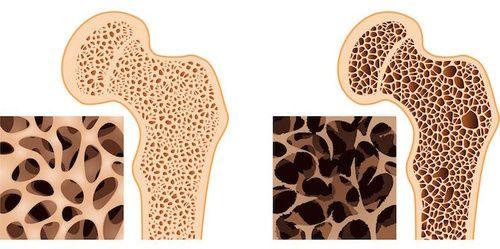The calcium deficiency it depends on a process of demineralization of the organism and causes muscular and skeletal pain, weakness, bone fragility and osteoporosis. Let's find out better how to cure it.
> Symptoms of calcium deficiency
> The cause
> How to integrate calcium deficiency with nutrition
Osteoporosis is a serious consequence of a lack of calcium

Symptoms of calcium deficiency
The shortage of football involves very specific and recognizable symptoms: muscle and skeletal pain, pain in the extremities of the fingers, forearm and lumbar area, cramps, weakness, bone fragility which leads, in severe cases, to particular deformations and osteoporosis, especially in women.
Calcium deficiency is also recognized by small signs: the skin becomes increasingly dry, the nails are brittle, hair is lost and tooth decay develops.
Other symptoms of calcium deficiency include an imbalance of thyroid, liver and kidney activity, as well as insomnia and tachycardia.
The causes of calcium deficiency
Calcium deficiency is closely related to a process of demineralization of the organism, for which the body starts an acid state, opposite to the healthy alkaline one and made possible by the presence of important minerals such as calcium, magnesium, iron, potassium, silicon, sulfur and sodium.
Calcium is, in fact, essential for balancing the alkaline pH of the blood. When the body begins to be deficient in these important alkaline minerals, it begins to take calcium from where it finds it available: bones, teeth and other organs.
In this case it is important that the organism is remineralized as soon as possible. Football decreases for several reasons, which can be related to both an unbalanced diet and other factors, such as alcohol abuse, menopause for women, seniority, lactose intolerance or allergy, use of cortisone or diets too high in fiber.
Natural calcium supplements: what they are and when to take them

Calcium deficiency and nutrition
The daily requirement of calcium it ranges from about 800 to 2500 milligrams, depending on age. The most important question is therefore how to overcome the calcium deficiency, remineralizing the organism system.
First of all, certain acidic foods must be avoided, such as coffee, chocolate, alcohol, most cereals and legumes, oily nuts and seeds, sugar, carbonated drinks, margarine, dairy products, cooked or processed foods. industrially and too much meat, too much fish or too many eggs.
Contrary to what one might think, it is not in fact by drinking milk that the body is remineralized: a raw food diet is an excellent way to rebalance it. Raw fruits and vegetables are in fact foods that make the body alkaline.
In addition to these there are also tubers, algae, sprouts, soya beans and derivatives (tofu, tempeh), cold-pressed extra virgin olive oil, herbal teas and infusions.
Vitamin D is equally important in facilitating the absorption of calcium. It is found in foods such as fish (salmon, herring and mackerel), eggs, butter, cheese. Furthermore, 10/15 minutes of exposure to the sun two or three times a week are enough to give us the necessary daily dose of vitamin D, as long as it is not filtered by glasses or clothes or hindered by bad habits such as smoking. 90% of the vitamin D present in the body is in fact produced following exposure to ultraviolet rays, called UV.
You can learn more about which foods are rich in calcium
Other articles on football:
> Calcium, the bone mineral
> The role of nutrition in calcium intake


























